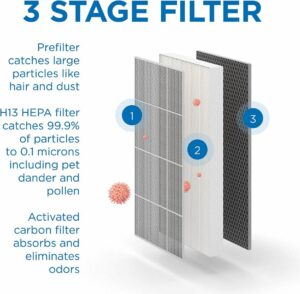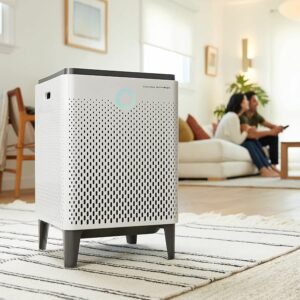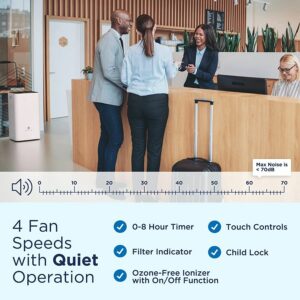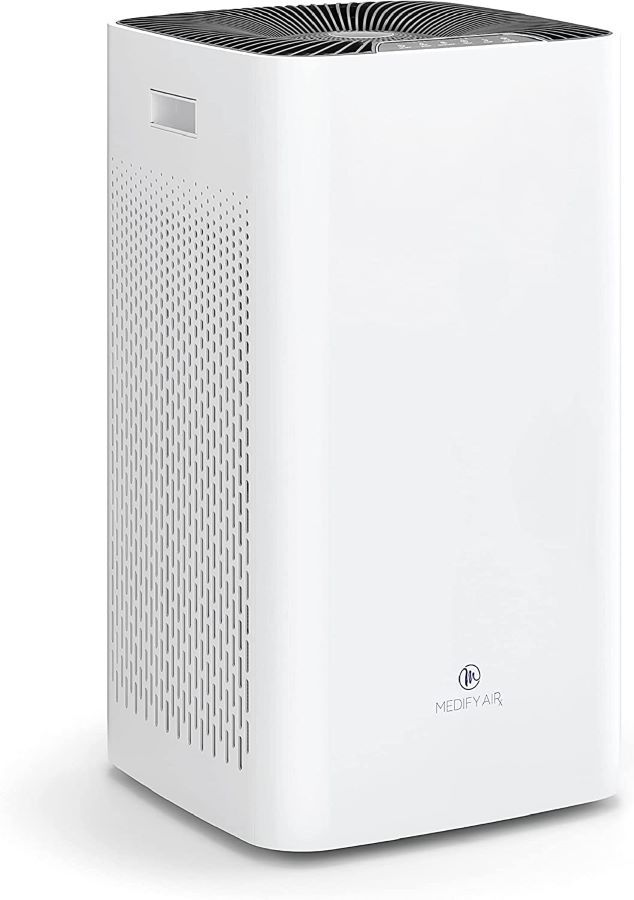Uncovering the Truth: Are HEPA Air Purifiers Safe?
As air pollution continues to worsen, air purification systems have become an increasingly popular way that the air we breathe is clean and healthy.
Among these air purifiers, High-Efficiency Particulate Air (HEPA) filters are some of the best air purifiers, but are they safe?
This article will look closely at HEPA air purifiers to uncover the truth about their safety.
Provo Green Products is your reliable source for discovering sustainable products that can positively impact your life and the environment.
With extensive experience in manufacturing, trades, and construction, Provo Green Products thoroughly researches each product before providing accurate and up-to-date information on its sustainability.
You can trust that you’re getting trustworthy insights to make informed choices whether you’re looking for solar products, electric bikes, eco-friendly products, renewable energy solutions, etc.
Provo Green Products is your go-to destination for finding the right green products for your lifestyle.
Disclosure: We may earn a small commission if you click on one of our links.
This does not affect the pricing of the product whatsoever.
Introduction to HEPA Air Purifiers
High-Efficiency Particulate Air (HEPA) filters are an air filtration system designed to capture airborne particles, such as dust, pollen, mold spores, tobacco smoke, dust mites, pet hair, toxic chemicals, and other allergens.
These filters comprise a dense mesh of fibers designed to trap fine and large particles and keep them from entering the air.
While they are not 100% effective, they can capture 99.97% of particles that are 0.3 microns and larger particles as well.
HEPA filters have been around since the 1940s. Still, they have become increasingly popular in recent years due to their ability to purify the air and reduce the risk of airborne particles.
A HEPA air purifier can be used in both residential and commercial settings, and they are often used in hospitals, laboratories, and other areas where clean air is of critical importance.
What is a True HEPA Filter?
A true HEPA filter meets the strict standards of the United States Department of Energy (DOE).
To be considered a true HEPA filter, the filter must capture 99.97% of particles that are 0.3 microns or larger.
It must also be able to withstand the rigors of everyday use, and it must be able to maintain its efficiency over time.
Many air purifiers on the market claim to be HEPA filters, but not all of them meet the strict standards set by the DOE.
You’ll need to do your research before purchasing a HEPA filter, which is essential to ensure that it is a true HEPA filter and not just a cheaper imitation.

Are HEPA Air Purifiers Safe?
In short, HEPA air purifiers are generally considered safe.
The filters capture particles that could harm your health, such as dust, pollen, and other allergens.
By filtering out these particles, HEPA air purifiers can help to reduce the risk of respiratory illnesses and other health problems.
In addition to being safe, HEPA air purifiers are relatively easy to use and maintain.
Most of them come with detailed instructions and typically require very little upkeep.
If you follow the instructions and take the necessary precautions, HEPA air purifiers should be safe and effective.
Do HEPA Filters Reduce the Risk of Airborne Particles?
Yes, HEPA filters can help to reduce the risk of airborne particles.
As previously mentioned, the filters are designed to capture particles that are 0.3 microns or larger, which includes many allergens and other particles that can cause health problems.
By filtering out these particles, HEPA air purifiers can help to reduce the risk of allergic reactions, asthma attacks, and other respiratory diseases.
In addition, they can also help to reduce the risk of eye irritation, sore throat, headaches, and other symptoms caused by exposure to airborne particles.
Do HEPA Filters Remove Volatile Organic Compounds?
Volatile organic compounds (VOCs) are chemicals released into the air from various sources, including paints, solvents, wood products, and other materials.
These chemicals can have multiple health effects, ranging from irritation of the eyes and nose to more serious respiratory problems.
HEPA air purifiers can help to reduce the risk of VOCs by capturing them in the filter.
However, it is essential to note that not all HEPA filters are created equal, and some may be more effective at capturing VOCs than others.
To ensure that your air purifier removes VOCs, it is best to look for one certified by the Association of Home Appliance Manufacturers (AHAM).

Benefits of Using a HEPA Filter
There are many benefits to using a HEPA filter, including improved indoor air quality, reduced risk of airborne particles, and reduced risk of VOCs.
In addition, HEPA filters will help to reduce the amount of dust and other particles in the air, which can help to reduce the risk of allergies and asthma attacks.
HEPA filters can also help to improve the overall indoor air quality in a home or office.
They can help to reduce the number of odors, pet dander, and other airborne pollutants, which can help to make the air in a room or building more pleasant.
How to Choose the Right HEPA Filter
When choosing a HEPA filter, there are a few things to consider.
First, you should ensure that the filter meets the standards the DOE sets.
Please also ensure that the filter is certified by the AHAM, as this will ensure that the filter can capture VOCs.
Also, please make sure that the filter is the right size for your needs.
A filter that is too small may not be able to capture all of the particles in the air, while a filter that is too large may cause the unit to become inefficient.
Finally, it will help if you also consider the filter’s cost.
While HEPA filters can be expensive, it is essential to remember that they can help save you money in the long run by reducing the number of allergens and other particles in the air.
HEPA Filter Maintenance
Once you have chosen the right filter for your needs, it is essential to maintain it properly.
Most HEPA filters require regular cleaning and maintenance to remain effective.
This includes cleaning the filter, filter replacements when necessary, and checking for any signs of damage or wear.
By correctly maintaining your HEPA filter, you can ensure that it remains effective and continues to filter out airborne particles.
This is important, as an inefficient filter may not be able to capture the particles that can cause health problems.

Are There Alternatives to HEPA Air Purifiers?
Yes, there are a few alternatives to HEPA air purifiers.
Ionizers and ozone generators are two common alternatives.
Ionizers use electrical charges to capture particles, while ozone generators use ozone to purify the air.
Both ionizers and ozone generators can effectively remove particles from the air but can also have a few drawbacks.
Ionizers can produce ozone, which can harm your health, while ozone generators can produce a strong odor.
Conclusion
In conclusion, HEPA air purifiers are generally considered safe and effective at reducing the risk of airborne particles.
They can also help to reduce the risk of VOCs and improve the overall air quality in a home or office.
However, ensuring that the filter meets the DOE standards and is appropriately maintained is essential.
If looking for an alternative to HEPA air purifiers, a few options are available, such as ionizers and ozone generators.
However, it is essential to remember that these alternatives can have their drawbacks, so it is best to research before deciding.
It is clear that HEPA air purifiers are a great way to improve indoor air quality in your home or office, but ensuring they are safe and effective is also essential.
Following the tips outlined in this article ensures that your HEPA filter works correctly and provides clean and healthy air.
The most important thing to remember is that you should always research before purchasing any air purifier.
By taking the time to investigate the options available, you can ensure that you are getting a safe and effective air purifier that will improve indoor air quality in your home or office.
Stay in Touch!
I’am a dedicated entrepreneur with many years of experience and an integrity-driven individual who is highly motivated to succeed. Leveraging extensive expertise in manufacturing, construction, and various trades, we can provide a solid foundation for sustainable living. Our meticulous research process guarantees that our information about each product is precise and current, allowing you to make informed decisions. A deep understanding of business operations empowers me to consistently implement improvements that result in ongoing success. Visit site.

